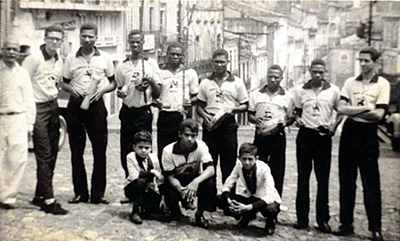One of the presents I have my homestay family was a jar of maple syrup, which I figured would be rare down here. I had a really hard time explaining what it was used for – my family was asking if you mix it in milk and drink it. Hrm. Maybe I’ll have to introduce them to french toast, or pancakes.
During my first evening of the homestay, I noticed that my family fed the dog biscuits out of this glass jar. Well, the next morning the jar was on the kitchen table, and they told me to have a biscuit. And I wasn’t sure whether they were people-biscuits that the dog happened to like, or dog-biscuits that they were trying to get me to eat so that they could laugh about it and tell their friends that the gullible American ate dog food. Luckily, it turned out to be the former!
They have a form of advertising here that I’ve never seen in the U.S. Cars drive around with a giant speaker tied to the roof, blaring advertisements for some club or event. I wouldn’t want to have the job of driving one of those around, because they’re freakin’ LOUD.
In our group there are a couple vegetarians (not including myself) and this is a concept pretty foreign to most Brazilians. At a restaurant, one of my friends asked for something without meat (carne) and the guy offered her something with chicken. She finally got her point across by saying “no meat, no chicken, no fish, and no cow!” so they guy gave her something with just cheese. A vegan would probably die down here.
My Brazilian Portuguese teacher doesn’t like coffee, doesn’t play soccer or capoeira, and doesn’t know how to dance. He called himself “the shame of his country.” But he’s trying to redeem himself by learning forró.
Speaking of interesting Brazilians, the other day I met a Chinese-Brazilian. He came here a couple years ago to set up his clothing store. I found it interesting that the only language we could communicate in was neither of our native languages.
Baseball is nonexistent here. My family told me they were interested in the sport, but couldn’t for the life of them figure out the rules. I managed, with more gesturing than speaking, to communicate the idea that if the batter hits a pitched ball and a fielder catches it then the batter can’t run, but if the fielder doesn’t catch it the batter can run, and they all went “aaaahhhh” because this was a major breakthrough. I had to tell them that there were many other rules, but that they were complicated, because otherwise I would’ve been explaining all night.
Riding the bus is interesting because public transportation etiquitte is very different than in the U.S. Here, people frequently sit in the seat closest to the front (since that’s where you exit the bus) even if that means doubling up when there are many empty pairs of seats available. For Americans, who like their personal space, that’d be considered rude, or at the very least really weird. Also, I was at first amazed at how quickly people in the front spring up to give their seat to the elderly, pregnant, and disabled, until I found out that it was illegal not to do so.
The other day I was chillin on the beach during lunch break and I saw two guys doing some capoeira moves. I went over to them, and when they heard I was also a capoeirista, they said “vamos jogar!” so I played a few random games with them on the beach. They gave me the address of their school (ABADA) but it’s far from my house. It’s just so cool to be in a country where seeing capo around is not uncommon, and I can go introduce myself to random capoeiristas on the beach and play a friendly game or two.



